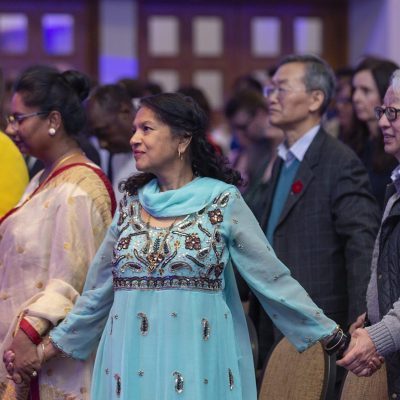Following the closure of the church in Whiteinch, three couples moved into the Glasgow district to restore the worshipping community.
More than 20 years after the revival of Whiteinch church, Shona Stirling, director of pastoral care at the church’s charity, Whiteinch Transformation, tells the Evangelical Alliance’s editorial content manager, Naomi Osinnowo, how the church and its charity are on a mission to see the kingdom of God break out across Scotland.
If you could sum up Whiteinch church in just a few sentences, what would they be?
We see church as much more than what we do on a Sunday. We, as followers of Jesus Christ, are the church, and we believe that we are to be the hands and feet of Jesus in the communities in which we find ourselves. We are a church that equips and empowers every member of our family in Christ to live in the fullness of all God meant for them, and to do what He has called them to do. We believe that in church, everyone gets to ‘play’, and so we see our whole congregation as ministers of the gospel, challenging them to be just that wherever they are.
How did Whiteinch church become a parish in its own right when so many churches were closing? What challenges
did you overcome along the way?
The church in Whiteinch closed and the congregation joined with those in the neighbouring parish of Scotstoun. In 1996, it was decided that it was time to replant back into Whiteinch. Three couples from the Scotstoun church moved into Whiteinch, becoming the core team for this plant. They met together to worship and pray. Soon, others from the community gathered with them and they outgrew their meeting space. In 2000, we became a parish in our own right, bucking the trend of church closures.
The congregation doesn’t only worship in Whiteinch; we live here and look for opportunities to serve the community. From children’s holiday clubs to helping people to move house and deliver furniture, we have found ourselves becoming part of the heart of the community. We have served on community councils and school boards, gaining credibility and favour. Over the years, we’ve gathered to worship in Whiteinch in various locations: a small shop front on the main street, both local primary schools and, since 2007, in the Whiteinch community centre.
There have been many challenges along the way. Because we haven’t had our own building, space to be able to work from has been limited. Setting up and taking down chairs, sound system, etc., every week for our Sunday gathering is time consuming and heavy work. Financing what we do has been, and continues to be, a challenge because we have always been a church which punches above its weight in terms of what we do. We have intentionally invested in people, raised up new leaders and then given away our best. Although this is a kingdom principle, which we continue to adhere to, it does present us with obvious challenges. In its partnership with charity Whiteinch Transformation, Whiteinch church is involved in a range of project work.
Why do you believe the church has a responsibility to meet the needs of communities?
Historically, the church has been at the forefront of change in society. As the people of God, we are supposed to be carriers of the gospel, which is good news. All around us we see hopelessness; this is not the kingdom of God. The kingdom of God is good news. Jesus came to bring hope to the hopeless, to release the captives, and to bring sight to the blind. And, in the great commission, He sends His followers out to make disciples and to do the same. We are told to go into all the world and do what He did. Jesus didn’t create problems, He brought solutions. He fed the hungry, He healed the sick, and He encouraged people to right their wrongs. He didn’t just talk it, He did it too.
How is the church meeting the specific needs of people in Glasgow?
Through our partnership with Whiteinch Transformation, we currently have four main strands of work: church planting, emotional health, children’s work, and ‘Love Whiteinch’. We believe that we are a church that is called to plant churches. We are currently replanting in a community in the east of Glasgow, but we expect that this is the first of a number of plants. We also train others in church planting and have been doing that for several years, now as part of the Forge Network. We want to see a vibrant, worshipping, witnessing church in every community and network in Scotland.
Healing for the Heart is our project concerned with emotional health and wellbeing. We have a counselling and an inner-healing service, offering appointments to folks in Whiteinch and beyond. We offer up to 30 hours of counselling sessions, and we train other churches and organisations to deliver effective pastoral care and ministry. Our team of 18 volunteer facilitators offers around 20 hours of ministry appointments
a month.
We work with both children and young people within the community. We are currently in partnership with the local Roman Catholic primary school to provide them with a member of staff to work with their vulnerable families and children, and to run the local toddler group. We take 40 – 50 children and young people from our community away to a summer camp each year, which we organise and run, and we provide a weekly gathering point for these young people throughout the year.
Love Whiteinch is the umbrella name for our local projects that are addressing poverty. As part of this, we run a weekly foodbank and have a Christians Against Poverty debt centre. We also work with the local recovery community, offering support and mentoring for those overcoming addictions.
Do you have a particular story of the church’s work that stands out to you?
It’s hard to pick one testimony because there are so many. Two real high points in the last five years have been the impact that Healing for the Heart has had on our church and our community, and being given the keys for the empty church building into which we are now planting.
Five years ago, Healing for the Heart was a small ministry team of six, which offered a few inner-healing sessions a month. Now we have five part-time members of staff and 18 volunteers, offering counselling and ministry for adults and children. We are currently partnering with other community groups to work with some of the most vulnerable people in our community, who wouldn’t be able to access what we can offer in any other place.
For 20 years, we have believed that we were called to be a church which plants churches. We have studied, learned, talked and prayed about this and finally, in 2017, we were given the keys to Ruchazie Parish church, which is the first of these church plants. We are now one church in two places and we are seeing the kingdom break out beyond our parish.
What is the church’s vision for the future?
Our vision is to develop an ‘Urban Monastery’. This follows the pattern of the Celtic Monks, and will see our work continue to develop across five areas: prayer and worship, mission, training, healing and renewal, and creativity. The ‘House of Prayer and Worship’, as it was with the Celtic Monks, is at the centre of this urban monastery. We will continue to place the highest value on prayer and worship underpinning everything we do, encouraging not only corporate but also personal rhythms.
Our mission base keeps us looking outward and focusing on bringing the good news of Jesus to those who haven’t heard it and who don’t know Him. This may be through more church plants. But it is, just as importantly, about encouraging individuals to share their faith and their testimony with others. We are developing a centre for training, which is essentially about discipleship. We have a vision to see thousands of people discipled, trained and released to go and make more disciples.
Our centre for healing and renewal carries with it the vision for a multidisciplinary therapeutic centre, which can offer social prescribing and will see the health of the community improve. It is essentially about transformation, whatever that looks like. The centre for creativity is about exploring all aspects of creativity, again in the broadest sense. It will encourage all forms of art, but will go beyond that to seeing creative solutions to what seem to be unsolvable problems.
In this edition of idea magazine, we’ve focused on the kingdom of God, thinking specifically about the Lord’s prayer when Jesus prays ‘Your kingdom come’. How does Whiteinch church’s ministry make God’s kingdom a reality on earth?
In Whiteinch, when we pray ‘Your kingdom come’, we are inviting in the rule and reign of God and all that brings. Our ministry is about seeing the kingdom of God break out in our community, our city and our nation. That means we want to see the rule and reign of God in every area of society – government, the media, education, healthcare, the arts, business, etc. As we engage with the things that people care about, we bring the light of Jesus into what is often darkness. We believe we are called to do what Jesus did: He was at the heart of His community, often among those who no one else wanted to be near. He saw value in everyone – even those who society didn’t value. He engaged with the lost and the least but also with those who held power and influence.
At the Evangelical Alliance’s inaugural Above and Beyond event, held in February, Fiona Bruce MP urged attendees to live out their faith practically. What’s your call to action for Christians in the UK?
When the Pharisees asked Jesus which is the greatest commandment, He tells them in Matthew 22:37: “Love the Lord your God with all your heart and with all your soul and with all your mind. This is the first and greatest commandment. And the second is like it: love your neighbour
as yourself.”
At the centre for all of us who are part of a faith community is prayer and worship – loving God. Our relationship and connection with Him is what makes us more than a social action group, but we should never be so heavenly minded that we are of no earthly use. Flowing from that relationship with God has to be action. We are meant to be the salt of the earth and the light in the darkness.
We all have something to offer that, without us offering it, a gap is created. Go fill the space that is there and that is just your fit. You don’t need to be anyone else; you simply need to be yourself, bring your loaves and fishes to the Lord, and let Him work His miracle. Offer your piece into the big picture; stop for the one and make a difference one life at a time. You don’t have to do what we’re doing, just look for what God might be doing in your context and join in – He’s already gone ahead of you, and everyone gets to play.




